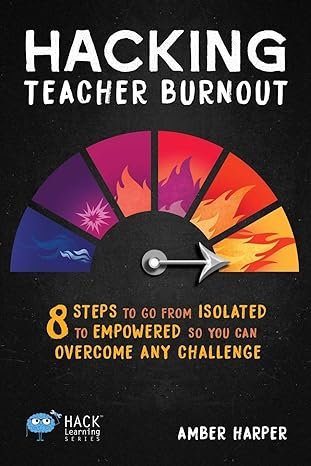
Amber Harper
Að forðast kulnun og breyta lífinu innan og utan skóla
Í fyrirlestri sínum talar Amber um mismunandi tegundir „útbrennslu” og hjálpar kennurum að koma auga á sína eigin stöðu, hvort þau séu á leið að brenna út og hvað hver og einn getur gert til að snúa við stöðunni. Sagan hennar hefst á punktinum sem heimurinn hennar hrundi og hún gat ekki meira og lýsir einangrun, gremju, bugun og skömm. Þátttakendur skanna QR kóða og taka stutt próf sem gefur þeim hugmynd að þeirra stöðu og hvað sé hægt að gera til að breyta lífinu innan og utan skóla!
“Your burnout is not your fault, but it is your responsibility to move through it rather than stay parked in it.”
— Amber Harper
Spurningar og svör frá Sli.Do
Q1: Could we make the argument that declining respect for education in modern society is a factor in the increase of burnout in the teaching profession?
Yes, declining respect for education can definitely be a factor in the increasing burnout among teachers. When educators feel their profession is undervalued by society, it can lead to stress and a sense of disillusionment. In the past, teachers were often seen as respected figures, trusted with shaping the future, but now many feel that their work is taken for granted or criticized. This lack of support from both society and parents can make it harder for teachers to do their jobs effectively, increasing the emotional toll. Teachers are also being asked to take on more responsibilities, such as managing testing and student behavior, but these efforts are often met with more criticism than appreciation. When students mirror this lack of respect or engagement, it makes the classroom environment even more challenging. Ultimately, this disconnect between the effort teachers put in and the recognition they receive can be draining, contributing to burnout. And in my case, I was harder on myself than anyone else was - and that’s what contributed most to my burnout - my own negative mindset toward myself and my profession.
Q2: Why is there not a psychologist in every school for teachers as well as students?
The main reason there isn’t a psychologist in every school for both teachers and students is often due to budget limitations and a lack of prioritization. Schools (much like mine) are underfunded and usually focus their resources on academic needs or student services. While mental health for students is recognized as important, teacher well-being often gets overlooked. There's an assumption that teachers can handle their own mental health, even though the stress of the job can be overwhelming.
Many schools may not fully realize how much teachers could benefit from having access to a psychologist. Supporting teachers’ mental health would help them perform better and avoid burnout, but it hasn’t been widely prioritized in many school systems yet.
Q3: In my opinion, the most serious issues are those concerning students. I take them to heart out of care for the students. We are bound by confidentiality; shouldn't there be a more active system for teachers to unload? Preferably in a way that is planned but doesn't require asking.
I understand how hard it is for teachers to carry the emotional weight of student issues (as I am a teacher in addition to someone who coaches them through burnout), especially with the limits of confidentiality. It’s important for teachers to have a way to unload that stress without always needing to ask for help. A more active system, like regular, planned sessions with a school counselor or psychologist, would allow teachers to talk about their challenges in a safe space. This would help them release stress, feel supported, and recharge emotionally. By making this kind of support available regularly, schools can help prevent burnout and create a healthier environment for teachers.
Hver er Amber Harper?
Amber starfar sem leikskólakennari og kulnunarþjálfari fyrir kennara. Eftir að hafa glímt við kulnun megnið af kennsluferli sínum, stofnaði Amber Burned-In Teacher árið 2016. Nú notar hún hlaðvarpið sitt, bókina, netnámskeið og samfélag til að leiðbeina kennurum í gegnum 8 þrep sem hún kallar ‘BURNED-IN ferli’ til að hjálpa þeim að nota kulnun sem tækifæri til vaxtar svo þeir geti breytt lífinu innan og utan skóla.



